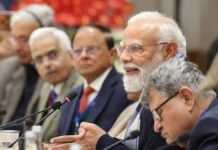INVC NEWS
Washington, D.C -: The pursuit of a green card in the United States can be an arduous and protracted process for many individuals, particularly those hailing from India, China, Mexico, and the Philippines. A senior US official recently shed light on the reasons behind the prolonged and often painful wait for green cards, attributing it to the quota system established for each country’s allocation—a system that only the US Parliament can modify.
Officially known as the Permanent Resident Card, a green card serves as evidence that its holder has been granted permission to reside permanently in the United States. However, the number of employment-based green cards issued annually is subject to limitations. Approximately 140,000 employment-based green cards are made available each year, with the caveat that only 7% of these cards can be allocated to any single country.
Douglas Rand, a senior advisor to the director of US Citizenship and Immigration Services, emphasized that the annual quota for green cards issued to family members of US permanent residents is 226,000 for the entire world. In contrast, the annual limit for employment-based green cards is 140,000. This restriction contributes to the extended waiting periods endured by individuals from India, China, Mexico, and the Philippines compared to applicants from other countries.
During an online event addressing visa and consular matters, Rand responded to a query by acknowledging that this quota system is responsible for the longer wait times experienced by individuals from the aforementioned countries. He expressed regret that only the US Parliament possesses the authority to revise this annual limit. Nevertheless, he emphasized that their primary responsibility is to ensure that these green cards are utilized each year when they become available.
The current situation poses a significant challenge for Indian immigrants who aspire to obtain green cards. With the limited number of green cards allocated to India, the demand far exceeds the supply. As a result, the waiting period can extend to several years, causing frustration and uncertainty among applicants and their families.
The consequences of this protracted waiting period are far-reaching. Individuals with pending green card applications face numerous hurdles, such as restrictions on job mobility, limited access to certain benefits, and uncertainty regarding their long-term plans and stability in the United States. This predicament affects not only the individuals awaiting their green cards but also their families, employers, and communities.
Efforts to reform the immigration system and address the challenges surrounding green card issuance have been ongoing. Advocacy groups, policymakers, and individuals impacted by the issue have been vocal in their calls for change. However, effecting such changes requires the involvement of the US Parliament, highlighting the importance of public awareness and engagement on this topic.
In conclusion, the extended wait times for green cards faced by individuals from India, China, Mexico, and the Philippines in the United States stem from the quota system that limits the number of green cards allocated to each country. While this issue persists, efforts to raise awareness and advocate for reform are crucial. The impact of these delays is significant, affecting the lives and aspirations of countless individuals and their families. Urgent attention and action are necessary to alleviate this issue and ensure a fair and efficient immigration process for all.
















